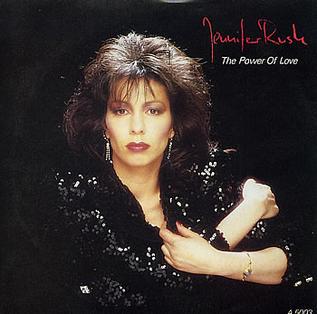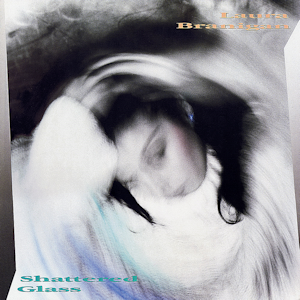
"Love Is Strange" is a crossover hit by American rhythm and blues duet Mickey & Sylvia, which was released in late November 1956 by the Groove record label.
Shirley Marie O'Garra was an American soul music singer and songwriter of West Indian heritage. She is best known for her novelty hits "The Nitty Gritty", "The Name Game" and "The Clapping Song". "The Clapping Song" sold over one million copies and was awarded a gold disc.

Laura Ann Branigan was an American singer. Her signature song, the platinum-certified 1982 single "Gloria", stayed on the U.S. Billboard Hot 100 for 36 weeks, then a record for a female artist, peaking at No. 2. It also reached number one in Australia and Canada. Branigan's "Gloria" was a cover of a song written by Italian singer-songwriters Giancarlo Bigazzi and Umberto Tozzi. In 1984, she reached number one in Canada and Germany with the U.S. No. 4 hit "Self Control", which was released by Italian singer and songwriter Raf the same year. Both "Gloria" and "Self Control" were successful in the United Kingdom, making the Top 10 in the UK Singles Chart.

Branigan 2 is the second studio album by American singer Laura Branigan, released in March 1983 by Atlantic Records. The album reached number 29 on the US Billboard 200 and was certified Gold by the Recording Industry Association of America (RIAA) on September 18, 1985, denoting shipments in excess of 500,000 copies in the United States. In a retrospective review for AllMusic, Bryan Buss wrote that Branigan's "full, expressive voice shows serious growth" on "a much more cohesive collection" than her debut album, Branigan, adding that "this album doesn't waste a single track".

Branigan is the debut studio album by American singer Laura Branigan, released in March 1982 by Atlantic Records. The album's lead single, "All Night with Me", reached number 69 on the US Billboard Hot 100, while the second single, an English version of Italian singer Umberto Tozzi's song "Gloria", was a commercial success, propelling Branigan to international prominence.

Hold Me is the fourth studio album by American singer Laura Branigan, released on July 15, 1985, by Atlantic Records. The album peaked at number 71 on the US Billboard 200, though it fared better internationally, reaching the top 10 in Sweden and Switzerland, and the top 15 in Norway.

"Say It Ain't So" is a song by American rock band Weezer. It was released as the third and final single from the band's self-titled 1994 debut album on May 15, 1995. Written by frontman Rivers Cuomo, the song came to be after he had all the music finished and one line, "Say it ain't so". Cuomo made a connection to an incident in high school where he came home and saw a bottle of beer in the fridge. He believed his mother and father's marriage ended because his father was an alcoholic, and this made him fear the marriage between his mother and step-father would end this way as well.
Swedish has a large vowel inventory, with nine vowels distinguished in quality and to some degree in quantity, making 18 vowel phonemes in most dialects. Another notable feature is the pitch accent, a development which it shares with Norwegian. Swedish pronunciation of most consonants is similar to that of other Germanic languages.
Dutch orthography uses the Latin alphabet. The spelling system is issued by government decree and is compulsory for all government documentation and educational establishments.

"Country Grammar (Hot Shit)" (also known as "Country Grammar (Hot...)") is the debut single of American rapper Nelly. The song was written by Nelly and Jason "Jay E" Epperson, who also produced the track. Released on February 29, 2000, as the lead single from Nelly's 2000 debut album, Country Grammar, the single peaked at number seven in both the United States and the United Kingdom and reached the top 20 in Australia, Canada, Germany, and the Netherlands.
"The Clapping Song" is an American song, written by Lincoln Chase, originally arranged by Charles Calello and recorded by Shirley Ellis in 1965.

"The Power of Love" is a song co-written and originally recorded by American singer-songwriter Jennifer Rush in 1984. It was released in December 1984 by CBS Records as the fifth single from her debut album, Jennifer Rush (1984), and has since been covered by Air Supply, Laura Branigan, and Celine Dion.
Dutch phonology is similar to that of other West Germanic languages, especially Afrikaans and West Frisian.
Bopomofo, also called zhuyin or occasionally zhuyin fuhao, is a transliteration system for Standard Chinese and other Sinitic languages. It is commonly used in Taiwan. It consists of 37 characters and five tone marks, which together can transcribe all possible sounds in Mandarin Chinese.
Non-lexical vocables, which may be mixed with meaningful text, are a form of nonsense syllable used in a wide variety of music. Common English examples are "la la la", "na na na" and "da da da".

"Shattered Glass" is a song written by Bob Mitchell and Steve Coe which was originally recorded in 1980 by Scottish singer Ellie Warren. The song was recorded in 1987 by American singer Laura Branigan with the Stock Aitken Waterman production team to serve as the lead single from Branigan's fifth studio album, Touch (1987).

Lincoln R. Chase was an American songwriter and occasional recording artist. As a writer, his most notable songs were "Such a Night", "Jim Dandy", and several of Shirley Ellis' hits in the early 1960s including "The Name Game" and "The Clapping Song".
In contemporary Japanese writing, foreign-language loanwords and foreign names are normally written in the katakana script, which is one component of the Japanese writing system. As far as possible, sounds in the source language are matched to the nearest sounds in the Japanese language, and the result is transcribed using standard katakana characters, each of which represents one syllable. For example, America is written アメリカ (A-me-ri-ka). To accommodate various foreign-language sounds not present in Japanese, a system of extended katakana has also developed to augment standard katakana.

Ingrian is a nearly extinct Finnic language of Russia. The spoken language remains unstandardised, and as such statements below are about the four known dialects of Ingrian and in particular the two extant dialects.











